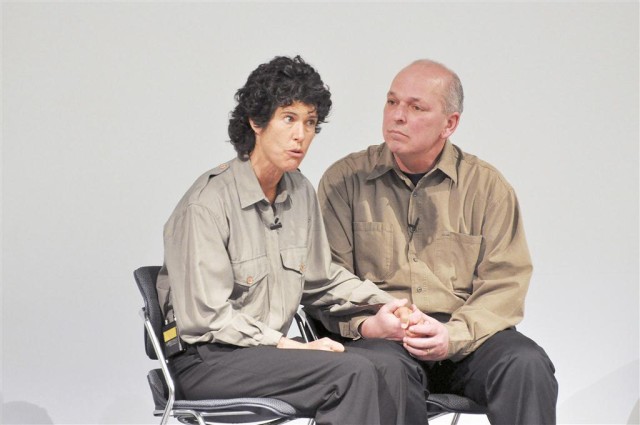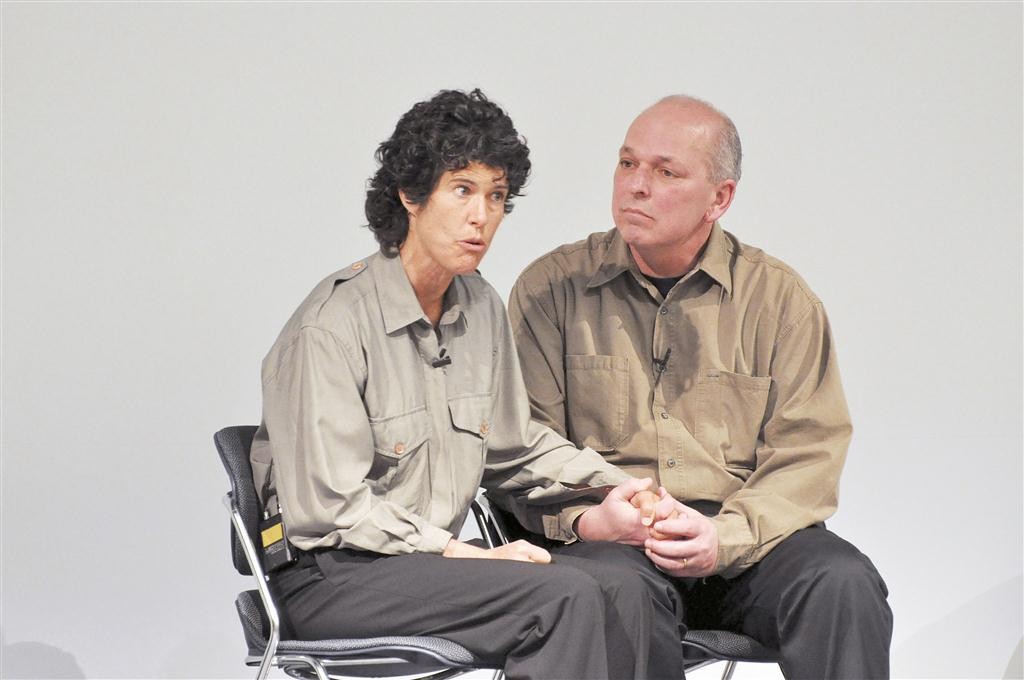WASHINGTON (Army News Service, Nov. 2, 2010) - "Into the Fire" gave some Pentagon workers Friday a chance to reflect on the challenges that face returning veterans with disabilities and combat-related traumas.
The two-person play in the Pentagon auditorium told the stories of veterans of Vietnam, Iraq and Afghanistan as they integrated back into their families, communities, educational institutions and the workforce.
Written and performed by Anthony Curry and Carrie Gibson, the vignettes told the stories as they were relayed to the pair by men and women who served.
Curry and Gibson recreated on stage the veterans they interviewed. They explored with the audience the generational effects of the war experience on the individuals themselves, their children and their families.
The vets they portrayed suffered from post-traumatic stress disorder, traumatic brain injury, hearing and limb loss, chronic pain and mobility challenges.
Humor and music were interspersed throughout the play, allowing the audience to digest and process the array of feelings Curry and Gibson created from their interviews. Through the team's interpretation, they worked to create emotional responses and thoughts designed to generate awareness, empathy and new ways to respond to vets as they rejoin society.
The pair's theater company - "Had to be Productions," based in Venice, Calif., -- had been creating, producing and acting on plays that spoke to multiple dimensions of diversity, race, ethnicity, religion, size, gender and sexual orientation. They also performed a play specifically on the disabled called "Not Just Ramps."
"Then someone asked us to write a play on combat vets returning with disabilities and combat-related trauma," said Curry, who is an award-winning actor, director and playwright. "When I asked why, she said, 'well, in the next couple of years there will be 400,000 disabled veterans coming home and no one knows how to deal with it.' Carrie and I were like - wow - but we don't know any vets, so she gave us the names of some veterans to interview and that's how it started.
"Once we started interviewing, we were immediately struck at how connected we were emotionally; how incredible the depth of our feelings were and how it actually clicked something in each of us that was not what we thought was going to happen," explained Curry.
While Gibson, like her partner, is a professional actor, she's double-hatted in that she holds a masters in psychology and has worked for a variety of social service agencies focused on issues related to addictions and personal growth. She has also created and led numerous workshops and retreats for adults, as well as facilitated therapy groups both in agencies and private practice.
"We want to make veterans completely visible because we have a tendency to sort of act like someone with a disability isn't really there," Gibson said. "So, one, we want to make this a very visible issue and two, our goal is to get everybody to feel emotionally connected to bringing these people all the way home - meaning employed, feeling valued, getting people to learn that this is all a part of the coming back process."
Curry and Gibson hope their play catches on within Department of Defense. Right now, Gibson said it's word of mouth in getting their play out there, though there is some talk about going to Kuwait to get their message across.
"This is not only a great educational tool," she said. "But it's also a really powerful healing tool."


Social Sharing